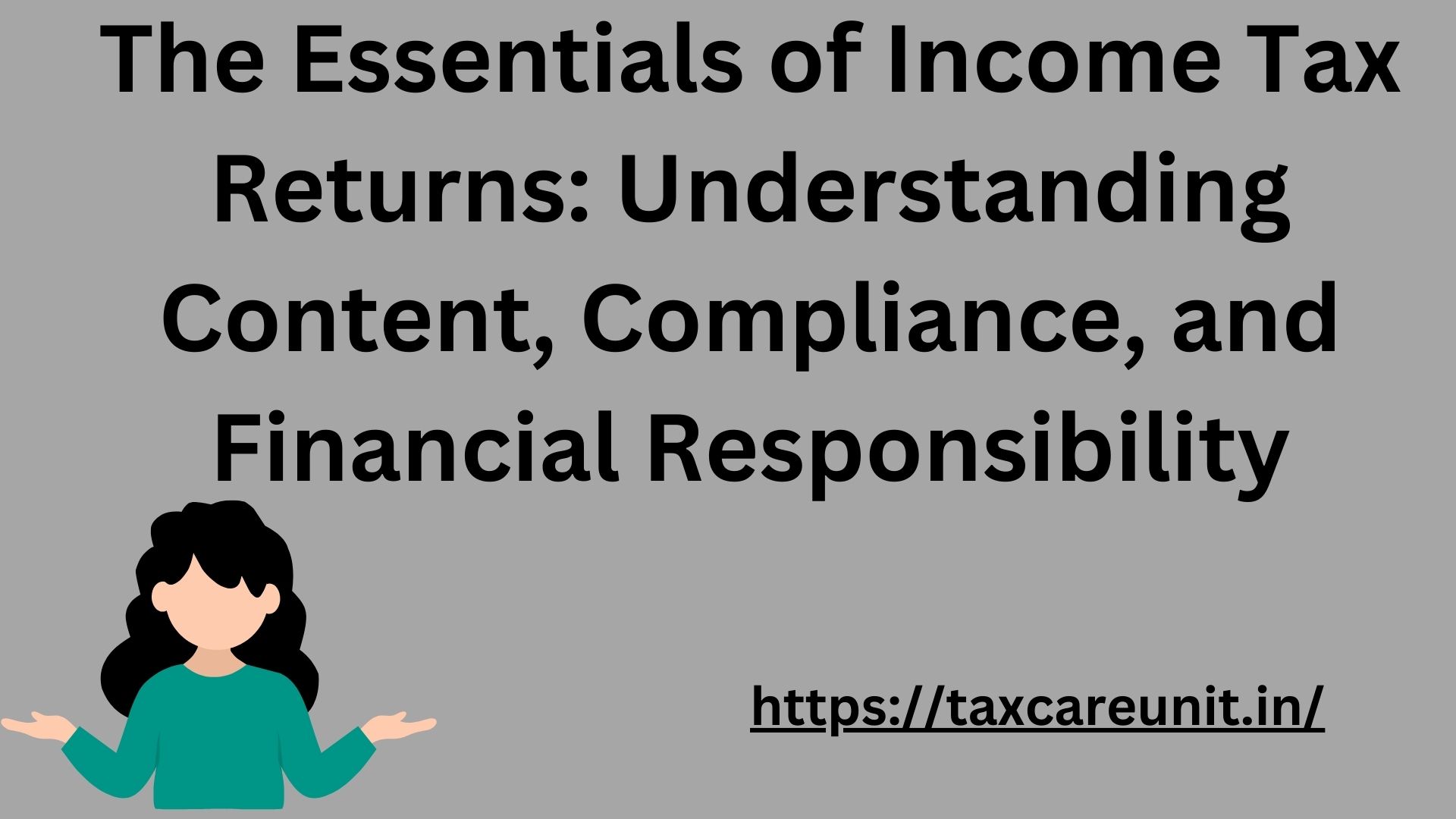
The Essentials of Income Tax Returns: Understanding Content, Compliance, and Financial Responsibility
An income tax return is a document that taxpayers file with the government to report their income and calculate the amount of tax they owe or the refund they are entitled to receive.
Filing Deadline Different countries have different tax filing deadlines. In the United States, for example, the usual deadline for filing federal income tax returns is April 15th. However, this date can be extended if you file for an extension.
E-Filing
Many tax authorities offer electronic filing options, commonly known as e-filing. E-filing is often faster and more convenient than paper filing, and it may also provide a quicker refund if you’re owed one.
Joint or Separate Filing
Married couples have the option to file their income tax returns jointly or separately. The choice can significantly impact your tax liability, so it’s essential to calculate your taxes both ways to determine which option is more favorable.
State and Local Taxes
In addition to federal income tax, you may also need to file state and local income tax returns, depending on where you live. These returns typically have their own set of rules, deductions, and credits.
Amending Returns
If you discover errors or omissions on a previously filed tax return, you can file an amended return (e.g., Form 1040X in the United States) to correct the information.
Tax Withholding
Your employer may withhold taxes from your paycheck based on your Form W-4 or equivalent. If you find that you owe a substantial amount of tax or receive a large refund each year, you may need to adjust your withholding to better match your actual tax liability.
Tax Software and Professionals
Many people use tax preparation software or hire tax professionals (such as certified public accountants or tax attorneys) to help them complete their tax returns accurately and efficiently.
Record-Keeping
It’s essential to keep copies of your filed tax returns and supporting documents for several years. The tax authorities may audit your return, and having records on hand can help you substantiate your claims.
Penalties and Interest
Failing to file a tax return or pay taxes owed on time can result in penalties and interest charges. It’s crucial to meet deadlines and address any outstanding tax liabilities promptly.
Tax Planning
Effective tax planning can help you legally reduce your tax liability. Consider consulting with a tax professional to identify strategies and opportunities for minimizing your tax burden.
Tax Software
There are various tax preparation software options available that can guide you through the process of filling out your tax return. These programs often automate calculations and can help ensure accuracy.
Electronic Records
In an increasingly digital world, it’s a good practice to maintain electronic copies of your tax-related documents and records. Securely store digital copies of your receipts, forms, and returns for easy access and retrieval.
Tax Credits for Education
If you or your dependents are pursuing higher education, there are tax credits available, such as the American Opportunity Credit and the Lifetime Learning Credit, that can help offset education expenses.
Tax Credits for Energy Efficiency
Some governments offer tax credits for energy-efficient home improvements, such as solar panels or energy-efficient appliances. These credits can reduce both your tax liability and your energy bills.
Foreign Income and Assets
If you have income or financial accounts in foreign countries, you may have additional reporting requirements, such as the Foreign Bank Account Report (FBAR) in the United States. Failing to report foreign income and assets can lead to significant penalties.
Tax Refund Options
When you’re entitled to a tax refund, consider direct deposit as it’s typically faster and more secure than receiving a paper check. You can often split your refund into multiple accounts if needed.
Tax Identity Theft
Protect your personal information to prevent tax identity theft. Scammers may use your identity to file fraudulent tax returns and claim refunds in your name. Be cautious when sharing personal information and report any suspicious activity to the tax authorities.
Tax Professionals
If your tax situation is complex or you’re unsure about how to handle certain deductions or credits, it’s a good idea to seek assistance from a tax professional, especially if you’re self-employed or have a business.
Estate Taxes
Inheritance and estate taxes may apply if you inherit assets or plan to leave a substantial estate to your heirs. Consult with an estate planning attorney to understand the implications and explore strategies for minimizing these taxes.
Tax Extensions
If you file for an extension, remember that it extends the time to file your return but not the time to pay any taxes owed. Make an estimated payment by the original deadline to avoid penalties and interest.
Tax Records Storage
Safely store your tax records for the recommended period (usually three to seven years, but it can vary by jurisdiction). Digital backups and cloud storage can help ensure you don’t lose important documents.
Tax Forms Accessibility
Tax forms and instructions are typically available on the website of your country’s tax authority. You can often download them or request paper forms by mail if needed.
Seek Advice
If you have specific questions or concerns about your income tax return, don’t hesitate to reach out to your country’s tax authority or consult with a qualified tax professional for guidance tailored to your situation.
Conclusion
An income tax return is a crucial document used by individuals and businesses to report their income, calculate their tax liability, and fulfill their tax obligations to the government. While the specific content and requirements of tax returns vary by country, several key elements and considerations apply universally



